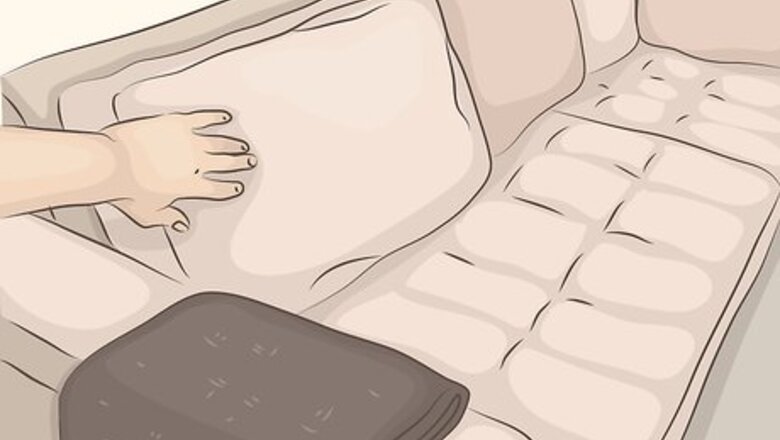
views
Clean up after yourself immediately.
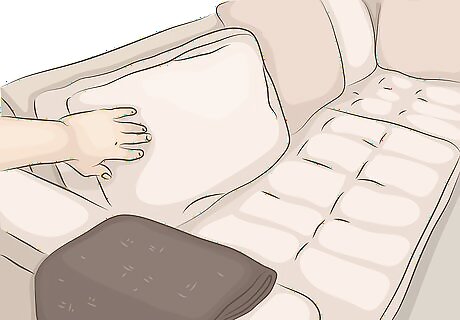
If you do this, maintaining a clean home is automatically less work. Almost everything is a lot easier to clean if you do it right away. And if something takes less than 5 minutes to clean, it's worth it to just do it now instead of putting it off for later. Get in the habit of putting things back the way they're supposed to be after you're done with them. For example, if you moved blankets and pillows while watching a movie in the living room, take a moment to fold the blanket and fluff the pillows when the movie is over. If you have small children who you don't trust to clean up everything by themselves yet, teach them to tell you about any spills or messes immediately instead of waiting.
Keep frequently used things in convenient places.
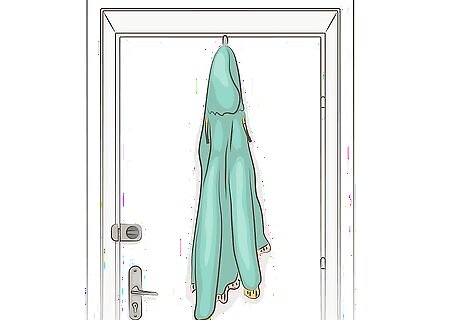
Keep things you use often easily accessible. You'll be more likely to put things away if it's easy to do so. Additionally, you'll be more likely to find your items again if you store them near where you would find them useful. Use more out-of-the-way storage options for things you only use occasionally. If you take the time to make a place for everything, it'll be easier to put things back where they go when you're done with them. For example, if you have a hoodie that you wear at least twice a week, you might put a hook on the door where you can hang it for easy access, rather than having to fold it and put it on a shelf in the top of the closet.
Store cleaning supplies in every room.
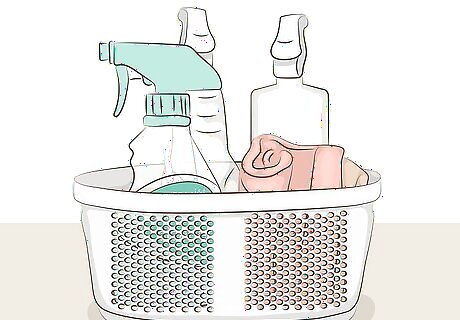
Use a plastic bin to organize the specific supplies you need for each room. This makes it easier to clean things up immediately because you don't have to go around hunting for what you need. Put bathroom cleaners in every bathroom, disinfectants and multi-purpose cleaners in all rooms, and kitchen cleaners in the kitchen. If it isn't feasible to have multiple brooms or vacuum cleaners, put these tools in a central location where they can be easily accessed from the entire home. If your home has two floors, though, it's still worth it to spring for one upstairs and one downstairs so you don't have to lug them back and forth. While this might mean that, initially, you have to buy several bottles of the same cleaning products, they'll last a lot longer because you're not using them all over the house. Sure, you'll spend a little more initially, but it'll even out.
Have a laundry hamper for each person.
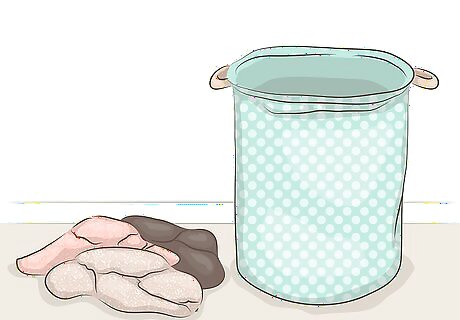
Put the laundry hamper in the area where each person typically changes clothes. Laundry is more likely to pile up in a corner or on the floor of the bathroom if the laundry hamper is inconvenient. Make sure there's at least one hamper for each person in your household and that they're all conveniently located. If you're not sure where to put the hamper, look at where the laundry typically piles up. If you're accustomed to tossing clothes in that spot, putting a hamper there won't change anything—it'll just make it look neater. If you have a washer and dryer in your home, get in the habit of immediately doing laundry when the hamper is full.
Set up a donation box.
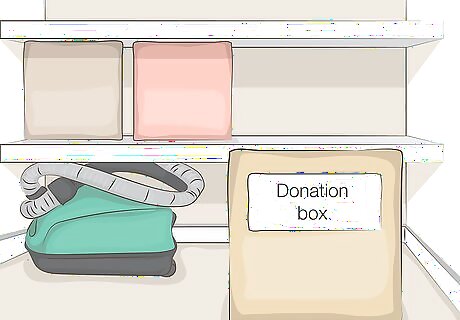
Keep a single box for things you no longer use. If you have a hall closet, that's a good place to put your donation box. If space is tight, you can also hang a bag on a hook inside a closet door. Clearly label your box or bag for donations, and put things into it as you go. When the box is full, take it to your favorite donation center. This is also helpful if you have children. As soon as a child grows out of something, put it straight into the donation box so you don't have to worry about it anymore. If you get in the habit of putting things into the box regularly, your closets and storage areas will always look neater and you won't have to tackle the hours-long task of sorting through things once or twice a year.
Make your bed every morning.
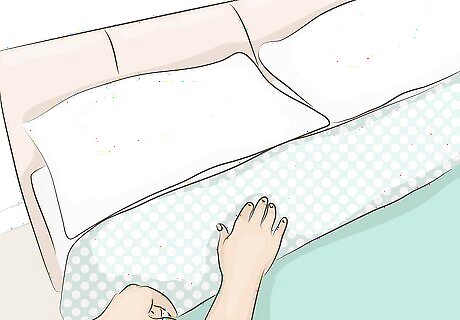
A tidy bed lifts the entire room and makes it look neater. Even if you have a few things out of place, if your bed is made, the room is already going to look a lot better. It really only takes a couple of minutes every morning to make your bed. Once you get in the habit of it, you won't miss the time. Making your bed every morning has a motivating effect as well. If you start your day by making your bed, that's one task that you've already successfully completed. It puts you in the frame of mind to complete other tasks as well.
Spray, then wipe the tub or shower after every use.
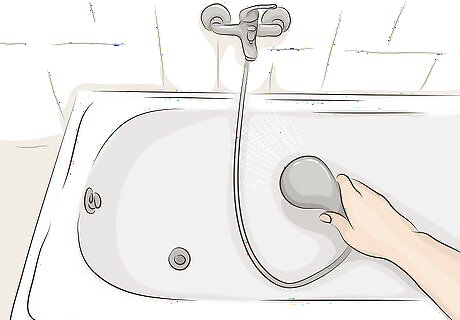
The steam and hot water from your shower or bath loosen grime. Your tub or shower is a lot easier to clean immediately after you get done using it. Doing this also keeps any dirt or soap scum from building up, so you never have to worry about scrubbing. If you keep the bottle of cleaner sitting in or next to your shower or tub, it'll remind you to do a quick spray when you get out. Then, after you've dried, you can quickly wipe down the shower or tub when you hang up your towel.
Use an empty box or basket to gather up clutter.
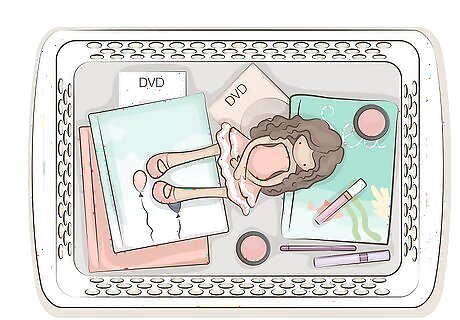
Take things that don't belong in that room and put them in your basket. Tidying up a room takes a lot longer when you have to walk back and forth to put things away. Simply pick up everything in the room that doesn't belong there and put it in a box or basket. Then, carry the basket with you and drop things off in the rooms where they belong. These baskets are handy in common rooms that multiple people use, such as your living room, dining room, or den. Find time during the day to gather things up—it should only take a minute or so—and then you can distribute them when you have a chance. For example, if you're leaving the living room to go to your bedroom, take a second to grab anything in the box or basket that belongs in your bedroom and take it with you.
Wipe down flat surfaces.
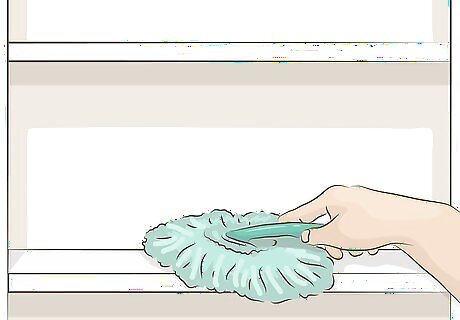
Use a duster or a slightly damp rag to wipe off shelves, tables, and counters. This shouldn't take more than a couple of minutes and can easily be done while you're doing something else, such as watching a program on TV. If you wipe off flat surfaces every day, things will always look a lot cleaner and dust and grime won't accumulate. Get in the habit of wiping things off as soon as you use them also. For example, it only takes a minute to wipe the table off after you've cleared the dishes from dinner.
Sweep or vacuum high-traffic areas.
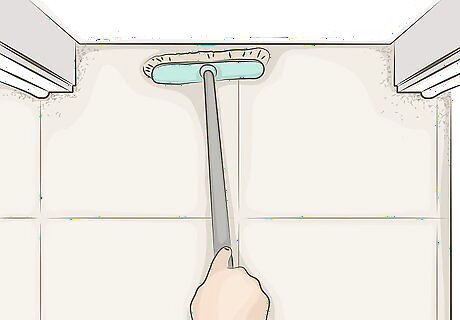
Take 5 minutes each day to clean the floors around doors and in hallways. The areas where people tend to walk the most are going to get the most dirt. Sweeping every day keeps this dirt from building up and also ensures no one will track it through the rest of the house. Sweeping the porch or entryway outside your door also limits the amount of outside dirt and debris people bring inside with them.
"Close down" the kitchen every night.
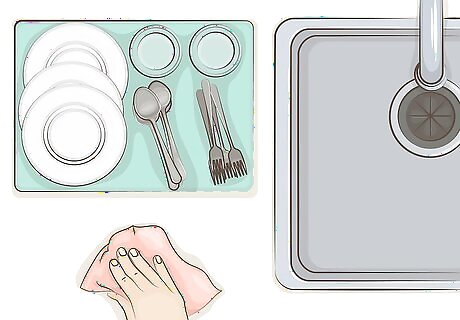
Treat it as though you're shutting down the kitchen in a restaurant. Make it a habit to never go to bed with a dirty kitchen. Take care of the dishes, clean and disinfect all the surfaces and handles, and sweep up any debris on the floor. The whole process shouldn't take more than 10 minutes. If you have housemates that are on different schedules, give the kitchen closing duties to whoever is the last person to use it. As long as everyone is cleaning up their own messes, it shouldn't be too big of a deal. If you have a dishwasher, start it at night (if it's full), then it'll be ready for you to unload the morning while you're making breakfast or brewing your coffee.
Clean your toilet as part of your bedtime routine.
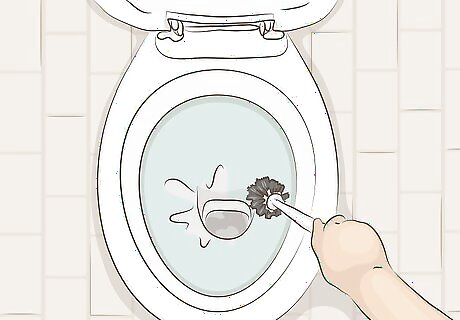
Squirt the toilet bowl cleaner in the bowl, then let it sit while you brush your teeth. After you're done brushing your teeth, washing your face, and whatever else you do at night to get ready for bed, give the toilet a quick scrub and a flush. That's all you need to keep the toilet bowl fresh!
Dust thoroughly in each room once a week.
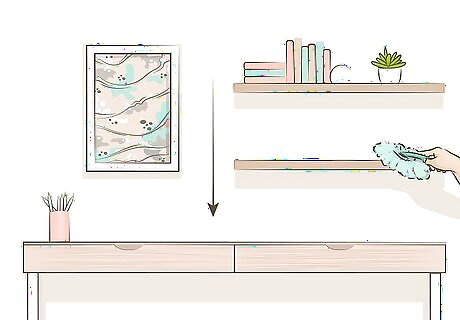
Work from top to bottom and left to right to thoroughly dust a room. Using this method means any dust or debris that gets swept off won't fall on an area you've already cleaned. This more thorough dusting gets the dust that might gather in more hard-to-reach places. For example, you might dust your bedroom on Monday, the living room on Tuesday, and the kitchen on Wednesday. Accumulated dust can affect the air quality in your home and make it more difficult to breathe, so this task is as much for your health as it is for the sake of cleanliness.
Clean the floors once a week.
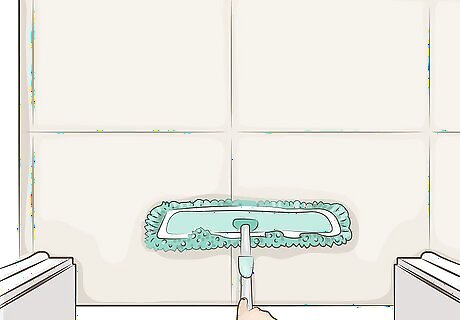
Mop or vacuum your way out of one room each day. Schedule a room (or two, depending on the size of your home) for each day of the week so you're not doing them all at once—it's a good idea to dust and clean the floor on the same day. Then, you can do the floor in that room on the same day each week. Start at the back corner of the room and mop or vacuum towards the door. Then, when you leave the room, you'll be done cleaning it! For example, you might vacuum your bedroom carpet on Monday, mop the living room on Tuesday, and mop the kitchen on Wednesday. School-age children can typically be taught to clean the floor in their own bedrooms.
Create a deep-cleaning schedule.
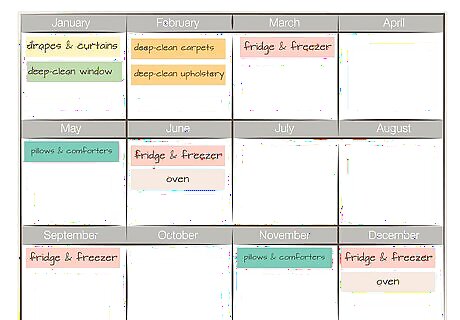
Set dates for larger cleaning projects that only need to be done every few months. A lot of cleaning tasks only need to be done about once every calendar quarter, twice a year, or even yearly. Schedule these tasks on a household calendar and set reminders so you'll know when they need to be done. Here are some tasks to get you started: Wipe down inside your fridge and freezer (every 3-6 months) Clean inside your oven (every 3-6 months) Wash pillows and comforters (every 3-6 months) Wash drapes and curtains (every year) Deep-clean windows (every year) Deep-clean carpets and upholstery (every year)




















Comments
0 comment